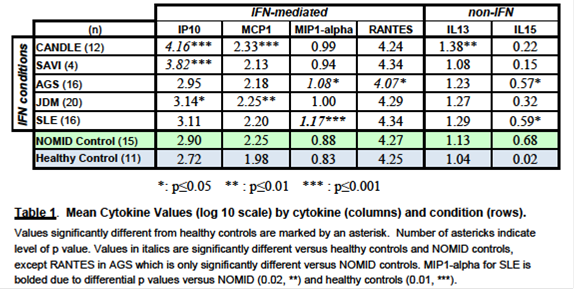Session Information
Session Type: ACR Poster Session C
Session Time: 9:00AM-11:00AM
Background/Purpose:
An
Interferon (IFN) Regulated Gene Signature (IRS) was previously reported in patients
with two complex autoimmune diseases, juvenile systemic lupus (JSLE)1
and juvenile dermatomyositis (JDM).2 Recently, three Mendelian conditions
including CANDLE syndrome3, STimulator of IFN Genes or STING-associated Vasculopathy with
onset during Infancy (SAVI)4, and Aicardi Goutieres syndrome (AGS)5
have demonstrated a prominent IRS. Previous evaluations6 found
clinical phenotypic overlap such as basal ganglia calcifications (CANDLE, AGS),
lipodystrophy (CANDLE, JDM), and myositis (JDM, CANDLE, SLE) raising interest
in a shared role of IFN in disease-pathogenesis. This study aims to assess cytokine
profile differences between IFN conditions, healthy controls and the IL-1
mediated monogenic disease, NOMID, to better understand pathogenesis and identify
potential disease-specific biomarkers.
Methods:
Plasma/serum
cytokine levels of 6 cytokines identified by literature review and preliminary
analysis6 were measured in 5 IFN conditions (3 Mendelian and 2
complex), the IL-1 mediated disease, NOMID, and healthy
controls using a multiplex bead -based assay (Luminex/Austin, TX). Analysis of
variance (ANOVA) followed by Dunnett’s tests were performed to identify
significant differences between each IFN condition and: 1) healthy controls and
2) NOMID (IL-1 mediated disease control). ANOVA, followed by Student-Newman-Keuls
post-hoc tests, were used to assess for significant differences among the 5 IFN
conditions. Statistical analysis done with Stata 12 (College Station, TX).
Results:
All
significant values are higher in an IFN condition than NOMID or healthy
controls, except RANTES which is lower in AGS versus NOMID. Most significantly
elevated are IP-10 in CANDLE and SAVI, and MIP1-alpha in SLE compared to healthy
controls and NOMID. Among the 5 IFN conditions, IP-10 is significantly higher
in CANDLE and SAVI versus AGS, JDM, and SLE. RANTES is significantly lower in
AGS versus the 4 other IFN conditions.
Conclusion:
The IFN
inducible chemokine, IP-10/CXCL10, is significantly elevated in CANDLE and SAVI,
even compared to AGS, JDM, SLE, and NOMID suggesting IFN-driven systemic inflammation
in CANDLE and SAVI. The monocyte migration factor MCP-1/CCL2 is similarly induced
in IFN diseases and the IL-1 disease, NOMID, consistent with its role in routine
immunological surveillance observed in a variety of inflammatory conditions. Significant
and specific elevation of MIP1-alpha may play a role in granulocyte recruitment
and activation in SLE. Distinct cytokine profiles in IFN and IL-1 mediated
diseases may help in understanding organ-specific inflammatory pathogenesis and
development of disease-specific biomarkers.
1Bennett, Exp Med, 2003,2Baechler, Mol Med,
2007, 3 Liu, A&R, 2012, 4Liu, NEJM,
2014, 5 Rice, Nat Gen, 2012 6 Kim, H. A&R,
2013
To cite this abstract in AMA style:
Kim H, Liu Y, Almeida de Jesus A, Wesley R, Huang Y, Montealegre Sanchez GA, Chapelle DC, Tsai WL, Gadina MG, Miller FW, Hasni S, Vanderver A, Rider LG, Goldbach-Mansky R. Cytokine Profile Comparison of Monogenic and Complex Conditions with Interferon-Regulated Gene Signatures in Chronic Atypical Neutrophilic Dermatosis with Lipodsytrophy and Elevated Temperature (CANDLE), SAVI, Aicardi-Goutieres Syndrome, JDM, and SLE [abstract]. Arthritis Rheumatol. 2015; 67 (suppl 10). https://acrabstracts.org/abstract/cytokine-profile-comparison-of-monogenic-and-complex-conditions-with-interferon-regulated-gene-signatures-in-chronic-atypical-neutrophilic-dermatosis-with-lipodsytrophy-and-elevated-temperature-candl/. Accessed .« Back to 2015 ACR/ARHP Annual Meeting
ACR Meeting Abstracts - https://acrabstracts.org/abstract/cytokine-profile-comparison-of-monogenic-and-complex-conditions-with-interferon-regulated-gene-signatures-in-chronic-atypical-neutrophilic-dermatosis-with-lipodsytrophy-and-elevated-temperature-candl/

